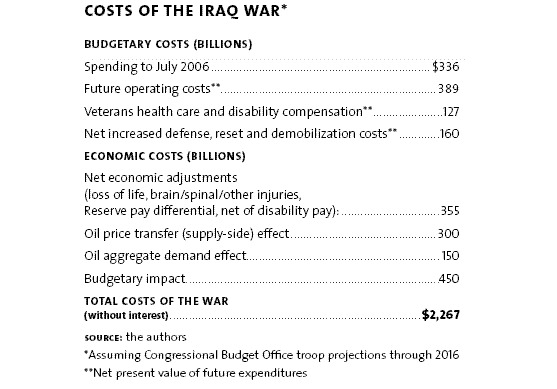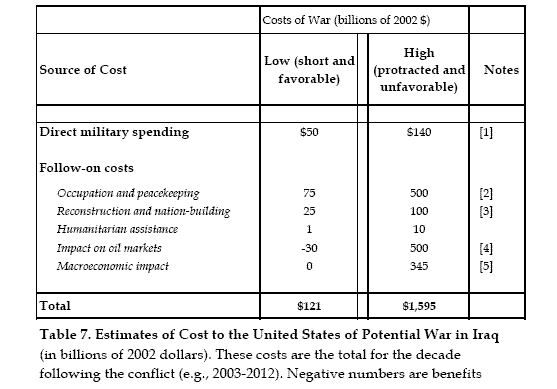Below is a chart comparing ten 2002-2008 cost estimates of the Iraq war. We present each estimate's low and high end, as well as their date ranges. Note that some estimates account for inflation, loan interest, war expenses into the next decade, and other factors while some estimates do not. Whenever possible, we have provided the full text of the report or speech that references the given estimate.
|
SOURCE OF ESTIMATE (EST.)
(in reverse chronological order by date of estimate) |
DATE OF ESTIMATE |
|
COST ESTIMATES
(in billions $US) |
|
LOW EST. |
HIGH EST. |
|
DATE RANGE OF EST. |
| 1. |
|
Mar. 2008* |
$1,800 |
$4,000 |
2003-2017 |
| 2. |
|
Sep. 2007 |
$10/year** |
$25/year** |
Long-Term Presence |
| 3. |
|
Dec. 2006* |
$2,000 |
$2,267 |
2003-2016 |
| 4. |
|
July 13, 2006 |
$493 |
$697 |
2003-2016 |
| 5. |
|
Feb. 27, 2004 |
$160 |
$160 |
2003-2004 |
| 6. |
|
June 27, 2003 |
$60 |
$95 |
None specified |
| 7. |
|
Dec. 31, 2002 |
$50 |
$60 |
None specified |
| 8. |
|
Oct. 29, 2002 |
$120 |
$1,600 |
2003-2012 |
| 9. |
|
Sept. 23, 2002 |
$100 |
$200 |
2003-2012 |
| 10. |
|
Sept. 16, 2002 |
$100 |
$200 |
None specified |
|
* The Dec. 2006 estimates by Linda J. Bilmes and Joseph E. Stiglitz included budgetary and economic costs of the war. Their Mar. 2008 estimates included budgetary, economic, and macroeconomic costs of the war.
** The Sep. 2007 CBO report also estimates a one-time cost of $8 for the low estimate and a one-time cost of $4-8 for the high estimate.
|
1. Linda J. Bilmes, MBA, Lecturer in Public Policy at the Kennedy School of Government of Harvard University, and Joseph E. Stiglitz, PhD, University Professor at Columbia University and Nobel Prize winning economist, wrote in their Mar. 2008 book The Three Trillion Dollar War: The True Cost of the Iraq Conflict:
"Combining past and future required expenditures, health and disability costs for veterans, and the expenditures hidden in the Defense Department budget, we estimate total expenditures for Iraq alone to be from $1.3 to $2 trillion-not counting interest payments...When we add the present discounted value of interest through 2017 alone, the total comes to $1.75 trillion for the best case scenario and $2.65 trillion for the more realistic one...
But this is still not the complete picture. It ignores the substantial 'social costs' of the war. We estimate that these social costs add at least $300 billion to $400 billion to the total of the war bill...
This brings our total costs-not including interest-to $2.0 trillion in the best case scenario, and $3.1 trillion in the realistic-moderate one...
There is one further important cost: that to the overall economy...
By adding these macroeconomic costs...we can get a full tally of the costs of the war...In the realistic-moderate scenario-the numbers that we believe (conservatively) best capture the costs of the Iraq venture, even without counting interest-the total for Iraq alone is more than $4 trillion; including Afghanistan, it increases to $5 trillion. Even in the best case scenario, where we have excluded most of the macroeconomic costs and have assumed a rosy scenario for the wind-down of the war, the cost of the Iraq war reaches $1.8 trillion, and the cost of the two conlifcts together reaches close to $2.2 trillion without including interest."
Mar. 2008 Linda Bilmes and Joseph E. Stiglitz and Joseph E. Stiglitz  
I. Table 5.1: "The Running Total: Adding the Macroeconomic Costs - Iraq and Afghanistan"
II. Table 2.2: "The Running Total: Budgetary Costs of the Iraq War"
|
|
|
3. Linda J. Bilmes, MBA, Lecturer in Public Policy at the Kennedy School of Government of Harvard University, and Joseph E. Stiglitz, PhD, University Professor at Columbia University and Nobel Prize winning economist, stated in their Dec. 2006 The Milken Institute Review article "Encore: Iraq Hemorrhage," an "update" of the Jan. 2006 working paper "The Economic Costs of the Iraq War":

"In January, we estimated that the true cost of the Iraq war could reach $2 trillion, a figure that seemed shockingly high. But since that time, the cost of the war – in both blood and money – has risen even faster than our projections anticipated...
The total costs of the war, including the budgetary, social and macroeconomic costs, are likely to exceed $2 trillion. As large as these costs are, an equally large set of costs have been omitted. We have not included the costs borne by other countries, either directly (as a result of military expenditures) or indirectly (as a result of the increase in the price of oil.)"
12/06 Linda Bilmes and Joseph E. Stiglitz and Joseph E. Stiglitz  
|
|
|
5. George Soros, founder of the Open Society Institute, stated in the article "The US Is Now in the Hands of a Group of Extremists," published in the Guardian/UK on Feb. 27, 2004:
"And the cost of the occupation is estimated at a staggering $160bn [billion] for the fiscal years 2003-2004 - $73bn for 2003 and $87bn in a supplemental request for 2004 submitted at the last minute in September 2003. Of the $87bn, only $20bn is for reconstruction, but the total cost of reconstruction is estimated at $60bn. For comparison, our foreign aid budget for 2002 was $10bn."
Feb. 27, 2004 George Soros
|
|
|
|
|
8. William D. Nordhaus, PhD, Sterling Professor of Economics at Yale University, in his Oct. 29, 2002 paper "The Economic Consequences of a War With Iraq," stated:

"...Be warned that this discussion vastly oversimplifies the analysis by constructing only two cases, whereas reality presents a dizzying array of outcomes. Returning to the metaphor of war as a giant roll of the dice, we might say that the US could end up paying the 'low' costs of around $120 billion if the dice come up favorably. If some dice come up unfavorably, the costs would lie between the low and the high cases. However, if the US has a string of bad luck or misjudgments during or after the war, the outcome, while less likely, could reach the $1.6 trillion of the high case."
Oct. 29, 2002 William D. Nordhaus  
|
9. The Democratic Caucus of the House Budget Committee stated the following in their Sep. 23, 2002 report "Assessing the Cost of Military Action Against Iraq: Using Desert Shield/Desert Storm as a Basis for Estimates":
"The attached analysis indicates that the initial military operation alone could cost $48 billion to $93 billion, if ten-year [2003-2012] interest costs are included. The report stresses that an initial military victory would be only one stage of an action against Iraq, and that other costs would be incurred...
The $48 billion to $93 billion estimate of the initial military operation assumes a war lasting 30 to 60 days and a US force ranging from 125,000 to 250,000 total troops (one-quarter to one-half the size of the Persian Gulf War force). Moreover, the analysis assumes US military operations will go as they went during the Persian Gulf War, with inept enemy forces, no use of chemical or biological weapons, access to bases and airspace in most Gulf states and Turkey, and low casualties on our side.
The report emphasizes that any or all of these variables could change for the worse, and if so, costs could be significantly higher than estimated. The report further discusses the fact that US costs of the Persian Gulf War were largely offset by allied contributions. Unless circumstances change, it appears unlikely the United States would receive such substantial contributions today. If this is the case, any new military action against Iraq would have a much larger impact on the budget than did the Persian Gulf War.
The report primarily focuses on estimating the costs of the initial military operation. However, when all costs are considered, Mr. Lindsey’s estimate of $100 billion to $200 billion seems to be in the ball park."
Sep. 23, 2002 Democratic Caucus of the House Budget Committee
Assessing the Cost of Military Action Against Iraq report  1 MB 1 MB     
|
10. Lawrence Lindsey, Director of the White House National Economic Council at the time of the quote, was quoted by the Wall Street Journal in the Sep. 16, 2002 article "Bush Economic Aide Says Cost Of Iraq War May Top $100 Billion":
"Lawrence Lindsey, head of the White House's National Economic Council, projected the 'upper bound' of war costs at between 1% and 2% of US gross domestic product. With the US GDP at about $10 trillion per year, that translates into a one-time cost of $100 billion to $200 billion. That is considerably higher than a preliminary, private Pentagon estimate of about $50 billion.
In an interview in his White House office, Mr. Lindsey dismissed the economic consequences of such spending, saying it wouldn't have an appreciable effect on interest rates or add much to the federal debt, which is already about $3.6 trillion. 'One year' of additional spending? he said. 'That's nothing.'"
Sep. 16, 2002 Lawrence Lindsey   and Wall Street Journal and Wall Street Journal   |
|